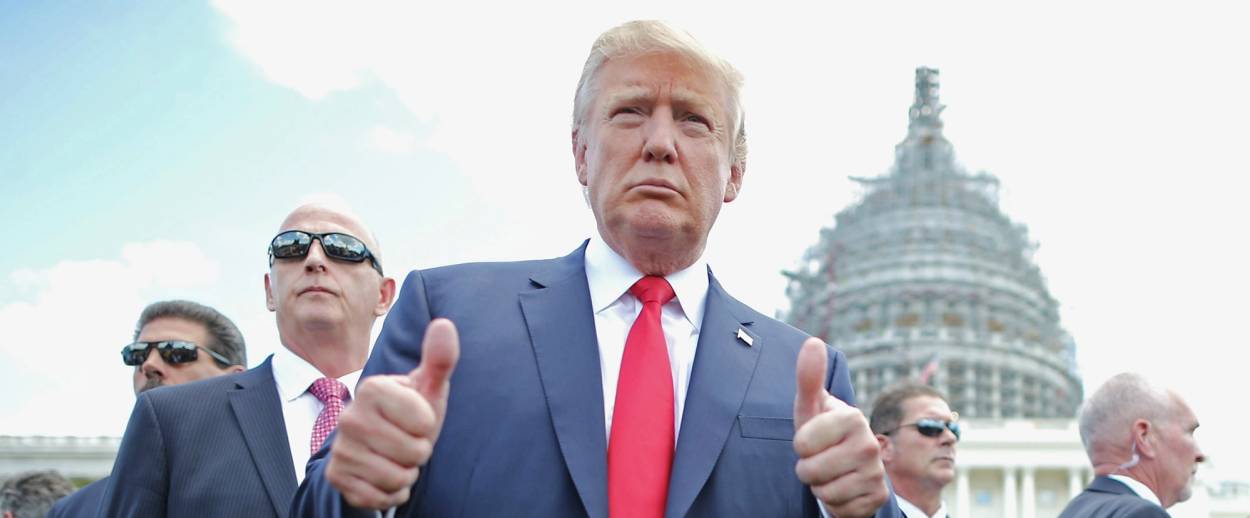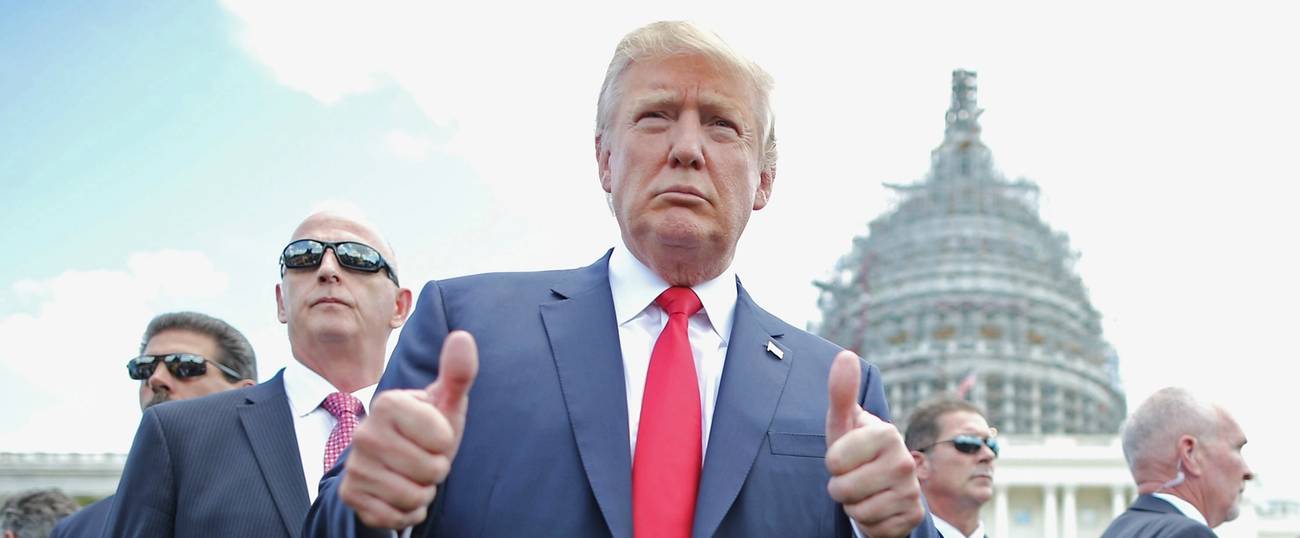Trump on the Israeli-Palestinian Conflict: I Got This
Let’s make a deal





Given his incoherency on just about every conceivable issue other than torture, one of the few interesting policy-related mysteries of Donald Trump’s flabbergasting campaign for the presidency is his exact definition of U.S. “neutrality” in the Israeli-Palestinian conflict, a concept he endorsed during a Republican debate in February without bothering to explain what he thinks this actually means.
Missing from Trump’s self-described “neutral” approach to the conflict were specific details (not that that should surprise anyone at this point). Trump has never shown any evidence of thinking about whether the Palestinian Authority can or even should be coaxed into ceding Israel control over the West Bank settlement of Ariel under a final peace agreement, or about the compensation of Palestinian refugees and their descendants, or Hamas’s role in a future Palestinian government, or about how to overcome the Palestinian Authority’s various negotiating preconditions.
Through taking a pro-“neutrality” stance, the presumptive Republican presidential nominee might have been advocating a radical shift in the U.S.’s approach to the conflict—one in which Washington would perhaps conditionmilitary aid on Israeli actions related to the peace process, or decline to use its United Nations Security Council veto to shield the country from international scrutiny in the absence of progress on the peace front. It was just as possible that Trump had no real policy prescription in mind, and viewed the Israeli-Palestinian peace process—“probably the toughest negotiation of any kind anywhere in the world”—as another opportunity to demonstrate his sublime deal making prowess, which he touts as one of his chief qualifications for leading the most powerful country on earth. “Neutrality” was either a serious and actually quite important policy suggestion with the potential of shifting the terms of the mainstream U.S. political debate on Israel, or just another Trumpian ego trip.
But the mystery over Trump’s views on the Israeli-Palestinian conflict is now, well, over. Thanks to Maggie Haberman and David Sanger of the New York Times, who published an extensive interview with Trump on his foreign policy views earlier this week, we now have fairly definitive proof that “neutrality” is another flight of egoism, rather than a radical break with decades of American policy consensus.
Haberman asked Trump whether he endorses a two-state or one-state outcome to the conflict. Trump briefly hearkened back to the notion of a more neutral U.S. approach to the issue, saying, “in order to negotiate a deal, I’d want to go in there as evenly as possible and we’ll see if we can negotiate a deal.” And he once again touched on what’s turned into a frequent Trump trope, referring to a stable of secret, anonymous sources and advisers who keep him uniquely informed on world affairs. “They really want to make a deal, they want to make a good deal, they want to make a fair deal, but they do want to make a deal,” Trump said of Israel. “And, almost everybody, and I’m talking to people off the record, and off the record, they really would like to see a deal.”
Aside from operating off of the novel premise that he would himself be personally negotiating an Israeli-Palestinian peace deal—which, to be fair, is something Bill Clinton nearly did late in his presidency—Trump discussed only two aspects of a future peace push with any kind of specificity: Alleged Palestinian Authority incitement of violence against Jews, and Palestinian Authority recognition of Israel as a Jewish state. “They have to stop the terror, stop the attacks, stop the teaching of hatred, you know?” explained Trump. He said nothing about potential Israeli concessions, and nothing about overhauling the U.S.’s overall approach to the conflict.
Unless, of course, the mere presence of Donald Trump at the negotiating table would itself be a fundamental shift. “I would say that I would have a better chance than anybody of making a deal,” Trump said, in a boast no less audacious than his weekend claim that he alone could solve the problem of jihadist terrorism. “Most people don’t think a deal can be made,” Trump conceded. But Trump is the maker of unmakable deals, deals that are impossible for anyone other than him to make. As to whatever transcendent negotiating skills or gifts of psychological insight enable such dealmaking—this, like the meaning of “neutrality” in the Israeli-Palestinian conflict, is beside the point.
As the blogger Scott Alexander noted in an incisive review essay of Trump’s 1987 book The Art of the Deal, lack of detail and specificity is actually central to understanding Trump’s entire worldview. The Trump who comes across in the book is “a-intellectual, in the same way some people are amoral or asexual,” Alexander writes. “The world is taken as a given. It contains deals. Some people make the deals well, and they are winners. Other people make the deals poorly, and they are losers. Trump does not need more than this…Trump’s world is so narrow it’s hard to fit your head inside it, so narrow that on contact with any wider world it seems strange and attenuated.”
Trump’s reality then, is comprised of little more than transaction and negotiation—details are uninteresting and even meaningless—with no discernible moral or political meaning connected to any of it. And as Haberman and Sanger’s interview further demonstrated, that tendency applies to one of the world’s oldest and most polarizing conflicts, too. The idea that even a phenomenally brilliant negotiator can parachute into a stalemated, decades-old conflict that doesn’t even directly involve the United States, and come away with an agreement between two reluctant and distrustful enemies might the most Trumpian conceit of all.
Related: Trump Watch [Tablet series]
Armin Rosen is a staff writer for Tablet Magazine.